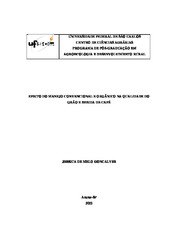Mostrar el registro sencillo del ítem
Efeito do manejo convencional e orgânico na qualidade do grão e bebida de café
| dc.contributor.author | Goncalves, Jessica de Melo | |
| dc.date.accessioned | 2022-10-31T16:34:51Z | eng |
| dc.date.available | 2022-10-31T16:34:51Z | eng |
| dc.date.issued | 2022-08-30 | eng |
| dc.identifier.citation | GONCALVES, Jessica de Melo. Efeito do manejo convencional e orgânico na qualidade do grão e bebida de café. 2022. Dissertação (Mestrado em Agroecologia e Desenvolvimento Rural) – Universidade Federal de São Carlos, Araras, 2022. Disponível em: https://repositorio.ufscar.br/handle/ufscar/16962. | * |
| dc.identifier.uri | https://repositorio.ufscar.br/handle/ufscar/16962 | por |
| dc.description.abstract | The different soil management practices adopted in coffee cultivation systems can influence the chemical attributes of the soil and consequently the mineral nutrition of plants, interfering with the quality of fruits, beans and coffee beverage. The different soil management practices adopted in coffee cultivation systems can influence the chemical attributes of the soil and consequently the mineral nutrition of plants, interfering with the quality of fruits, beans and coffee beverage. The objective of the study was to evaluate the effects of soil chemical attributes and leaf mineral nutrition on the quality of coffee beans and beverage (Catuaí Vermelho, Coffea arabica L.) under conventional and organic systems. Soil chemical attributes, leaf contents, grain and beverage quality were evaluated. The pH and the contents of organic matter, magnesium, boron, copper, iron and manganese in the soil did not differ between the conventional and organic systems. The highest levels of sulfur and phosphorus in the soil were observed in the organic system and the highest levels of zinc and potassium in the conventional system. The foliar contents of nitrogen, phosphorus, magnesium and boron were higher in the coffee plants in the conventional system and the foliar contents of potassium and zinc in the organic system. There was evidence on the behavior of soil samples and leaf tissue from the two systems, which offered favorable conditions for fruit development, presenting in the organic system higher values of TSS and grain diameters and in the quality of the coffee beverage the sensory attributes presented similar scores, both coffees received a score of 83, being classified as specialty coffees. | eng |
| dc.description.sponsorship | Não recebi financiamento | por |
| dc.language.iso | por | por |
| dc.publisher | Universidade Federal de São Carlos | por |
| dc.rights | Attribution-NonCommercial-NoDerivs 3.0 Brazil | * |
| dc.rights.uri | http://creativecommons.org/licenses/by-nc-nd/3.0/br/ | * |
| dc.subject | Análise foliar | por |
| dc.subject | Análise física | por |
| dc.subject | Análise sensorial | por |
| dc.subject | Leaf analysis | eng |
| dc.subject | Physical analysis | eng |
| dc.subject | Sensory analysis | eng |
| dc.title | Efeito do manejo convencional e orgânico na qualidade do grão e bebida de café | por |
| dc.title.alternative | Effect of conventional and organic management on the quality of bean and coffee drinks | eng |
| dc.type | Dissertação | por |
| dc.contributor.advisor1 | Verruma-Bernardi, Marta Regina | |
| dc.contributor.advisor1Lattes | http://lattes.cnpq.br/3470912236544684 | por |
| dc.contributor.advisor-co1 | Fontanetti, Anastácia | |
| dc.contributor.advisor-co1 | Liska, Gilberto Rodrigues | |
| dc.contributor.advisor-co1Lattes | http://lattes.cnpq.br/3598362104615834 | por |
| dc.contributor.advisor-co1Lattes | http://lattes.cnpq.br/2217949943647601 | por |
| dc.description.resumo | As diferentes práticas de manejo adotadas nos sistemas de cultivo do café podem influenciar os atributos químicos do solo e consequentemente a nutrição mineral das plantas interferindo na qualidade dos frutos, grãos e bebida de café. O objetivo do estudo foi avaliar os efeitos dos atributos químicos do solo e nutrição mineral foliar na qualidade do grão e bebida de cafeeiros (Catuaí Vermelho, Coffea arabica L.) em sistemas convencional e orgânico. O pH e os teores de matéria orgânica, magnésio, boro, cobre, ferro e manganês no solo não diferiram entre os sistemas convencional e orgânico. Os maiores teores de enxofre e fosforo no solo foram observados no sistema orgânico e os maiores teores de zinco e potássio no sistema convencional. Os teores foliares de nitrogênio, fósforo, magnésio e boro foram superiores nos cafeeiros no sistema convencional e os teores foliares de potássio e zinco no sistema orgânico. Verificou-se evidências sobre o comportamento das amostras de solo e tecido foliar dos dois sistemas, que ofereceram condições favoráveis para o desenvolvimento dos frutos, apresentando no sistema orgânico maiores valores de SST e diâmetros de grãos e na qualidade da bebida do café os atributos sensoriais apresentaram notas similares, ambos os cafés receberam pontuação 83, sendo classificados como cafés especiais. | por |
| dc.publisher.initials | UFSCar | por |
| dc.publisher.program | Programa de Pós-Graduação em Agroecologia e Desenvolvimento Rural - PPGADR-Ar | por |
| dc.subject.cnpq | CIENCIAS AGRARIAS | por |
| dc.publisher.address | Câmpus Araras | por |
| dc.contributor.authorlattes | http://lattes.cnpq.br/4036594256871871 | por |


